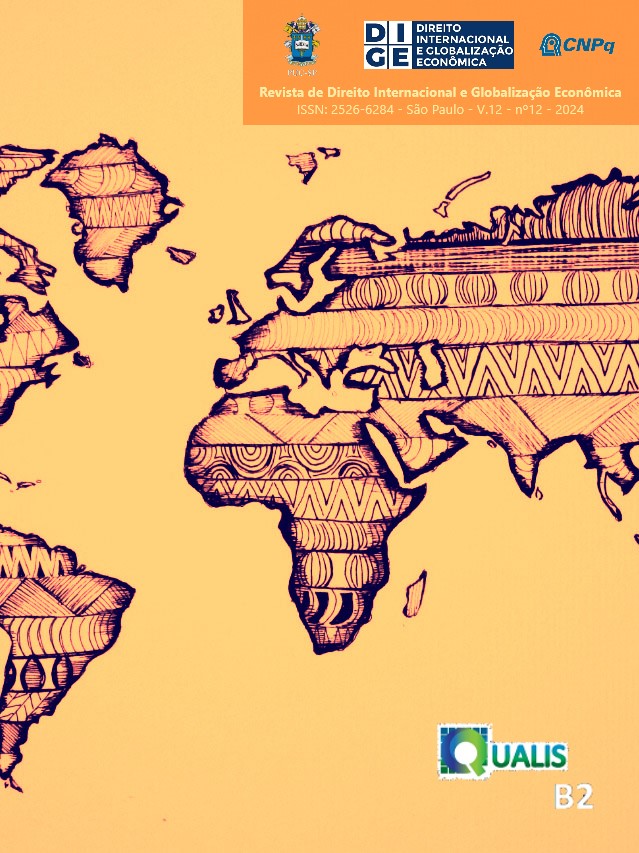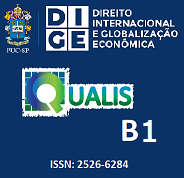Avançando a Governança Global:
Integrando o Conceito de um Futuro Compartilhado para a Humanidade com o Estado de Direito Ambiental Internacional
DOI :
https://doi.org/10.23925/2526-6284/2023.v12n12.68585Mots-clés :
International law, international relations, golobal governance of the environment, ChinaRésumé
O conceito de uma comunidade com um futuro compartilhado para a humanidade representa a visão da China para a governança global na nova era da globalização, tendo um mundo sustentável ambientalmente como seu princípio central. O estado de direito ambiental internacional é crucial para a construção de uma civilização ecológica global. No entanto, alcançar esse objetivo enfrenta desafios significativos, incluindo a fragmentação do direito ambiental internacional, mecanismos de implementação frágeis e estruturas insuficientes para a resolução de disputas ambientais. Aproveitando sua rica conotação, o conceito de um futuro compartilhado para a humanidade pode desempenhar um papel crucial no avanço do estado de direito ambiental internacional. Isso inclui o fortalecimento dos princípios fundamentais do direito ambiental internacional, a orientação para o desenvolvimento de um marco jurídico mais coeso, o aprimoramento dos mecanismos de aplicação e a promoção da coordenação internacional na resolução de disputas ambientais. Nesse sentido, este estudo argumenta que o conceito de um futuro compartilhado para a humanidade é fundamental para incorporar visões de mundo alternativas na ordem internacional existente, reforçando o estado de direito ambiental internacional. Isso envolve traduzir a visão para a linguagem do direito ambiental internacional e estabelecer plataformas inovadoras para integrar o conceito com abordagens legais e institucionais à governança ambiental global.
Références
Alam, S., Atapattu, S., Gonzalez, C. G., & Razzaque, J. (Eds.). (2015). International Environmental Law and the Global South. Cambridge University Press.
Anghie, A. (2007). Imperialism, Sovereignty and the Making of International Law (1 edition). Cambridge University Press.
Barnett, J. (2009). Environmental Security. In R. Kitchin & N. Thrift (Eds.), International Encyclopedia of Human Geography (pp. 553–557). Elsevier. https://doi.org/10.1016/B978-008044910-4.00774-4
Bodansky, D. (2011). The Art and Craft of International Environmental Law (Reprint edition). Harvard University Press.
Boucher, S. (2018). Stances and Epistemology: Values, Pragmatics, and Rationality. Metaphilosophy, 49(4), 521–547. https://doi.org/10.1111/meta.12317
Boyle, A. E. (2006). Globalising environmental liability: The interplay of national and international law. In G. Winter (Ed.), Multilevel Governance of Global Environmental Change: Perspectives from Science, Sociology and the Law (pp. 559–586). Cambridge University Press. https://doi.org/10.1017/CBO9780511720888.024
Castro, D. (2017). The Colonial Aspects of International Environmental Law: Treaties as Promoters of Continuous Structural Violence. Groningen Journal of International Law, 5, 168–190. https://doi.org/10.21827/5a6af9c46c2ff
Castro, D. (2024). The Implications of Chinese Investment on Latin America’s Energy Transition. Associação de Estudos Brasileiros Em Macau. http://aebm.mo/en/list-38/207
Castro, D., & Denny, D. M. T. (2020). Economic Relationship between Brazil and China: An Empirical Assessment Using Sentiment and Content Analysis. Beijing Law Review, 11(1), Article 1. https://doi.org/10.4236/blr.2020.111016
Castro, D., & Zhang, S. (2022). ECOLOGICAL CIVILIZATION AND BELT ROAD INITIATIVE: A CASE STUDY Civilização ecológica e iniciativa do cinturão e rota: um estudo de caso. Cadernos Do CEAS Revista Crítica de Humanidades, 47, 218–239. https://doi.org/10.25247/2447-861X.2022.n255.p218-239
Chimni, B. S. (2017). International Law and World Order: A Critique of Contemporary Approaches (2nd ed.). Cambridge University Press. https://doi.org/10.1017/9781107588196
Coenen, J., Bager, S., Meyfroidt, P., Newig, J., & Challies, E. (2021). Environmental Governance of China’s Belt and Road Initiative. Environmental Policy and Governance, 31(1), 3–17. https://doi.org/10.1002/eet.1901
Coicaud, J.-M., & Wheeler, N. J. (Eds.). (2008). National Interest and International Solidarity: Particular and Universal Ethics in International Life. United Nations University Press.
Copeland, B. R. (2013). Trade and the Environment. In D. Bernhofen, R. Falvey, D. Greenaway, & U. Kreickemeier (Eds.), Palgrave Handbook of International Trade (pp. 423–496). Palgrave Macmillan UK. https://doi.org/10.1007/978-0-230-30531-1_15
Cozier, M. (2017). The US withdrawal from the Paris Agreement: A global perspective. Greenhouse Gases: Science and Technology, 7(5), 774–777. https://doi.org/10.1002/ghg.1736
Davies, T. (2014). NGOs: A New History of Transnational Civil Society (1 edition). Oxford University Press.
de Castro, D., & Yu, Z. (2023). Unpacking the interplay of class, production, and sustainable development in international environmental law through the lens of Evgeny Pashukanis’ commodity theory. Cogent Social Sciences, 9(1), 2238457. https://doi.org/10.1080/23311886.2023.2238457
Ding, J., & Cheng, H. (2017). China’s Proposition to Build a Community of Shared Future for Mankind and the Middle East Governance. Asian Journal of Middle Eastern and Islamic Studies. https://www.tandfonline.com/doi/abs/10.1080/25765949.2017.12023314
Freeman, C. P. (2020). An Uncommon Approach to the Global Commons: Interpreting China’s Divergent Positions on Maritime and Outer Space Governance. China Quarterly, 2020, 1.
Gao, X. (2023). Unveiling the Laws of the Rise and Fall of Civilizations, and Mapping the Path of Civilizational Development—The Theoretical Implications and Practical Value of the Global Civilization Initiative. Interpret: China. https://interpret.csis.org/translations/unveiling-the-laws-of-the-rise-and-fall-of-civilizations-and-mapping-the-path-of-civilizational-development-the-theoretical-implications-and-practical-value-of-the-global-civilization-initiat/
Garver, G. (2013). The Rule of Ecological Law: The Legal Complement to Degrowth Economics. Sustainability, 5(1), Article 1. https://doi.org/10.3390/su5010316
Hansen, M. H., Li, H., & Svarverud, R. (2018). Ecological civilization: Interpreting the Chinese past, projecting the global future. Global Environmental Change, 53, 195–203. https://doi.org/10.1016/j.gloenvcha.2018.09.014
He, G., Lu, Y., Mol, A. P. J., & Beckers, T. (2012). Changes and challenges: China’s environmental management in transition. Environmental Development, 3, 25–38. https://doi.org/10.1016/j.envdev.2012.05.005
Heggelund, G., & Backer, E. B. (2007). China and UN environmental policy: Institutional growth, learning and implementation. International Environmental Agreements: Politics, Law and Economics, 7(4), 415–438. https://doi.org/10.1007/s10784-007-9053-3
Hickel, J., & Slamersak, A. (2022). Existing climate mitigation scenarios perpetuate colonial inequalities. The Lancet Planetary Health, 6(7), e628–e631. https://doi.org/10.1016/S2542-5196(22)00092-4
Hough, P. (2021). Environmental Security: An Introduction (2nd edition). Routledge.
Hovi, J., Sprinz, D., & Underdal, A. (2009). Implementing Long-Term Climate Policy: Time Inconsistency, Domestic Politics, International Anarchy. Global Environmental Politics, 9, 20–39. https://doi.org/10.1162/glep.2009.9.3.20
Hui, Z. (2019). A Community of Shared Future for Mankind—The Contemporary Development of the Social Foundations Theory of International Law*. Social Sciences in China. https://www.tandfonline.com/doi/abs/10.1080/02529203.2019.1556489
Jinping, X. (2015). Xi Jinping: The Governance of China: Shanghai Press.
Johns, L. (2022). Politics and International Law: Making, Breaking, and Upholding Global Rules (New edition). Cambridge University Press.
Keohane, R. O., & Jr, J. S. N. (2011). Power & Interdependence (4 edition). Pearson.
Koskenniemi, M. (2004). The Gentle Civilizer of Nations: The Rise and Fall of International Law 1870-1960. Cambridge University Press.
Krasner, S. D. (1983). International Regimes. Cornell University Press.
Krasner, S. D. (1999). Sovereignty – Organized Hypocrisy. Princeton University Press.
Krieger, H., Nolte, G., & Zimmermann, A. (Eds.). (2019). The International Rule of Law: Rise or Decline? Oxford University Press.
Liu, N., Yasin, M. A. I., Alsagoff, S. A., Ng, C. F., & Li, M. (2023). A Community of Shared Future for Mankind: A study on the news discourse of environmental cooperation in countries along the Belt and Road Initiative. PLOS ONE, 18(10), e0293296. https://doi.org/10.1371/journal.pone.0293296
Marcelli, F. (2019). A Shared Future of Mankind: A New Concept and its Paramount Pedagogical Importance. 9–15. https://doi.org/10.2991/icpcs-19.2019.2
McCarthy, N., Winters, P., Linares, A. M., & Essam, T. (2012). Indicators to Assess the Effectiveness of Climate Change Projects. https://publications.iadb.org/publications/english/document/Indicators-to-Assess-the-Effectiveness-of-Climate-Change-Projects.pdf
McCorquodale, R. (2016). Defining the International Rule of Law: Defying Gravity? The International and Comparative Law Quarterly, 65(2), 277–304.
Mertz, O., Halsnæs, K., Olesen, J. E., & Rasmussen, K. (2009). Adaptation to Climate Change in Developing Countries. Environmental Management, 43(5), 743–752. https://doi.org/10.1007/s00267-008-9259-3
Mutua, M. (2000). What Is TWAIL? Proceedings of the ASIL Annual Meeting, 94, 31–38. https://doi.org/https://doi.org/10.1017/S0272503700054896
Nasser, S. H. (2006). Fontes e Normas do Direito Internacional. Um Estudo Sobre a Soft Law. Atlas.
Peel, J., & Osofsky, H. M. (2020). Climate Change Litigation. Annual Review of Law and Social Science, 16(1), 21–38. https://doi.org/10.1146/annurev-lawsocsci-022420-122936
Putnam, R. D. (1988). Diplomacy and Domestic Politics: The Logic of Two-Level Games. International Organization, 42(3), 427–460.
Randers, J. (2012). 2052: A Global Forecast for the Next Forty Years (Illustrated edition). Chelsea Green Publishing.
Sands, P., Peel, P. J., Fabra, A., & MacKenzie, R. (2018). Principles of International Environmental Law (4th Revised ed. edição). Cambridge University Press.
Shapiro, J. (2016). China’s Environmental Challenges (2nd edition). Polity.
Soft Law Governance: Towards an Integrated Approach. (2013). William S. Hein & Co., Inc.
Stephens, T. (2009). International Courts and Environmental Protection (1st edition). Cambridge University Press.
UNEP. (2017). Environmental Rule of Law. UNEP - UN Environment Programme. http://www.unep.org/explore-topics/environmental-rights-and-governance/what-we-do/promoting-environmental-rule-law-0
Wei, F., Cui, S., Liu, N., Chang, J., Ping, X., Ma, T., Xu, J., Swaisgood, R. R., & Locke, H. (2021). Ecological civilization: China’s effort to build a shared future for all life on Earth. National Science Review, 8(7), nwaa279. https://doi.org/10.1093/nsr/nwaa279
Xiaochun, Z. (2018). In Pursuit of a Community of Shared Future: China’s Global Activism in Perspective. China Quarterly of International Strategic Studies, 04(01), 23–37. https://doi.org/10.1142/S2377740018500082
Yang, S. (2023). Growing Apart: China and India at the Kigali Amendment to the Montreal Protocol. Global Environmental Politics, 23(2), 74–101. https://doi.org/10.1162/glep_a_00698
Young, P. O. R. (1989). International Cooperation: Building Regimes for Natural Resources and the Environment. Cornell University Press.
Zhang, H.-B., Dai, H.-C., Lai, H.-X., & Wang, W.-T. (2017). U.S. withdrawal from the Paris Agreement: Reasons, impacts, and China’s response. Advances in Climate Change Research, 8(4), 220–225. https://doi.org/10.1016/j.accre.2017.09.002




